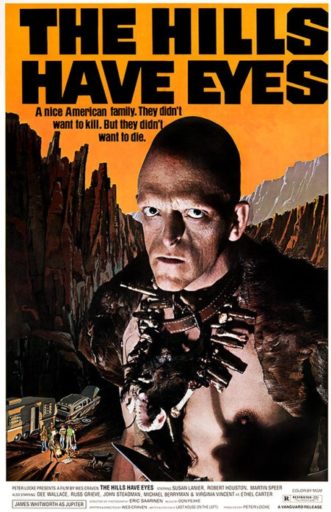 A true horror classic, this early Wes Craven film shows that once upon a time he was one of the fastest, meanest, most relentless filmmakers in or out of the horror genre. His 1971 debut, the ultra-low budget LAST HOUSE ON THE LEFT, showed that he wasn’t afraid to really take the genre to the edge. THE HILLS HAVE EYES, made after several years of fruitless attempts at making a non-horror movie, has a similar sensibility. As with the earlier film, the budget was extremely tight, and THE HILLS HAVE EYES, also in common with LAST HOUSE, is chock full of shocking brutality. The violence here is nasty and animalistic, far removed from the slick Hollywood sensibilities of later Wes Craven opuses like SCREAM.
A true horror classic, this early Wes Craven film shows that once upon a time he was one of the fastest, meanest, most relentless filmmakers in or out of the horror genre. His 1971 debut, the ultra-low budget LAST HOUSE ON THE LEFT, showed that he wasn’t afraid to really take the genre to the edge. THE HILLS HAVE EYES, made after several years of fruitless attempts at making a non-horror movie, has a similar sensibility. As with the earlier film, the budget was extremely tight, and THE HILLS HAVE EYES, also in common with LAST HOUSE, is chock full of shocking brutality. The violence here is nasty and animalistic, far removed from the slick Hollywood sensibilities of later Wes Craven opuses like SCREAM.
No discussion of THE HILLS HAVE EYES is complete without noting the unmistakable comparisons to an earlier low budget horror sleeper: THE TEXAS CHAINSAW MASSACRE. Both films have similar storylines and both have become quite influential in the years since their inceptions. It’s obvious Craven borrowed quite a bit from Hooper’s film, in particular production designer Robert Burns, who apparently recycled many props from CHAINSAW. No, THE HILLS HAVE EYES isn’t as good as CHAINSAW, but the effect it had on the genre is colossal; the film’s greatest influence has been, interestingly enough, on literary horror and authors like Jack Ketchum (whose infamous OFF SEASON is practically a rewrite of Craven’s film) and Joe Lansdale. Incidentally, THE HILLS HAVE EYES, while not a huge success, even inspired a 1985 sequel, which has the dubious distinction of being one of the all-time worst, and a 2006 remake, which isn’t as strong.
The Carters are a nice suburban family driving through the California desert. They have the misfortune to crash their caravan amidst a truly Godforsaken stretch of dusty rocks. The sun goes down and the Carters realize they’re not alone—a family of inbred savages lives in the rocks, birthed by an old man who runs a nearby gas station. Appropriately enough, it’s the latter who gets killed first, by his errant son, who bursts in through a gas station window and snatches him away. The son, named Jupiter (who’s named his own son Mars), also snatches away the “nice” father, whom he crucifies and burns to a crisp.
There’s no doubt about it: back in 1977 Wes Craven was one of the absolute finest genre filmmakers on the scene.
The night is host to another attack, by two of the evil family’s sons who kill the mother and her grown daughter…and steal the latter’s baby. The next morning the surviving Carters find themselves at the end of their collective ropes, and end up surpassing their adversaries in savagery. The Carter’s dog manages to pick off two of the bad guys, pushing one off a cliff and goring another’s neck. The remaining Carters are just as vociferous in killing off their adversaries, at one point even using their mother’s corpse as bait!
The sheer relentlessness of the brutality remains unsurpassed, and the stunt work has a raw desperation that places it far above most Hollywood fare.
There’s no doubt about it: back in 1977 Wes Craven was one of the absolute finest genre filmmakers on the scene. His editing and camerawork in THE HILLS HAVE EYES are flat-out brilliant, particularly in the final third, when the intensity reaches a near-unbearable pitch. The sheer relentlessness of the brutality remains unsurpassed, and the stunt work has a raw desperation that places it far above most Hollywood fare. Yes, the tacky 16mm film stock takes some getting used to, even in the remastered DVD release, and the film’s single take shooting ratio is painfully evident in the oft stilted performances. The rocky desert locations, on the other hand, are quite striking and not a little eerie, certainly one of the most unique and unforgettable horror movie landscapes I’ve seen.
Vital Statistics
THE HILLS HAVE EYES
Blood Relations Co./Anchor Bay Entertainment
Director/Screenwriter/Editor: Wes Craven
Producer: Peter Locke
Cinematographer: Eric Saarinen
Cast: Susan Lanier, Robert Houston, Martin Speer, Dee Wallace, Russ Grieve John Steadman, Michael Berryman, Lance Gordon, Virginia Vincent, James Whitworth, Janus Blythe, Cordy Clark, Peter Locke
